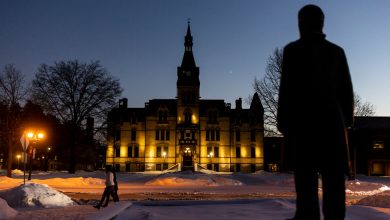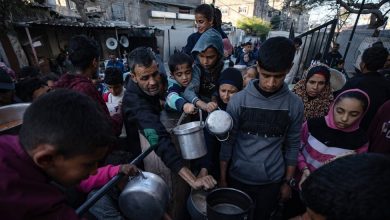In Fiji’s Closely Observed Election, a Former Coup Leader Is Ahead

It was a clash between two former coup leaders, set against the backdrop of a remote and palm-fringed vacation destination that has, of late, taken on outsized importance in a battle for primacy in the Pacific between the United States and China.
And with the military constitutionally permitted to intervene if it saw fit, that contest was one with the potential to become extremely volatile.
So, as voters went to the polls for the general election on Wednesday, focus turned to Fiji, an island nation known regionally for its stormy politics and which experienced four coups between 1987 and 2006. This was the country’s third general election since they were reintroduced to the Constitution in 2013.
In preliminary results, Sitiveni Rabuka, the leader of the People’s Alliance party — who led Fiji’s first coup in 1987 — appeared to have secured a narrow victory against the strongman incumbent, Prime Minister Josaia Voreqe Bainimarama. Mr. Bainimarama, widely known by the first name Frank, himself seized power with the help of the military in 2006, before winning democratic elections in 2014 and 2018.
The vote count is expected to take as long as two days, with ballots trickling in from outer islands and remote villages. The first set of results was delayed by a matter of hours, as the country’s election results app worked only intermittently. Late on Wednesday night, the release of provisional results was placed on hold as the Fijian Election Office contended with operational difficulties.
But as of Wednesday night, Mr. Rabuka’s party, the People’s Alliance, had taken a convincing lead over Mr. Bainimarama’s party, Fiji First.
Whether Mr. Bainimarama intends to honor the results remains unclear. Speaking to foreign reporters before the results were released, the former leader said he would “of course” respect the outcome of the election, even if they were not in his favor. He added: “Haven’t they got any intelligent reporters from Australia to come ask me a better question than that?”
But experts have warned that Mr. Bainimarama may yet seek to intervene with the support of the military, with which he maintains a close relationship. The country’s Constitution gives final control over citizens’ “security, defense and well-being” to the military, a clause that is widely understood to mean that it has the right to intervene if it sees fit.
“It will come down to how the military leadership sees it,” said Dominic O’Sullivan, a professor of political science at Charles Sturt University in Australia. Though the head of the military had in recent days encouraged people to vote and vowed not to interfere, he added, “You can’t take that as an absolute, unbreakable commitment, because it does have the constitutional power.”
Before results were counted, Mr. Rabuka suggested that Mr. Bainimarama might appeal to the court system in the event that his party was not the victor. “I’m hoping for a flood of votes in our favor,” he said, “so that if he makes any attempt at going through that system, that course, it will be futile.”
Fiji, with a population of about a million people and by far the largest economy of its region, grew closer to China in 2006 after an initial burst of investment from Beijing. The funding was particularly timely as Fiji faced damaging sanctions from Australia and New Zealand related to the coup in which Mr. Bainimarama came to power.
The relationship with China could enter a new, more distant phase under Mr. Rabuka, who earlier this year indicated that he would prefer closer ties to Australia, a longtime ally of Fiji, instead of signing a mooted security pact with Beijing.
The early election results come after a bitter contest and amid a government clampdown on supporters of opposition parties and the press. In one high-profile example, a pro-opposition lawyer who had made light of an error in a legal document was convicted of contempt of court, a sign of Fiji’s eroding civil liberties.
With little pre-election polling, analysts have struggled to predict an outcome. For 48 hours until the election ended, Fiji underwent a media blackout, in which all political parties were forbidden from campaigning. Citizens were prohibited from making political posts on social media, displaying banners and wearing colors or logos of parties. Those who break the rules could be subject to stiff penalties, including prison.
Even with little coverage from the news media in Fiji itself, there were early signs that Mr. Bainimarama’s support might be declining, including a dwindling voter share over the last two elections. There is also a sense of disgruntlement among voters about some of the economic challenges the country faces in the wake of the coronavirus pandemic, which devastated its all-important tourism industry.
“The government’s been in office for a while, and people tend to tire of long-term governments,” said Professor O’Sullivan.
Even Mr. Bainimarama’s government had sought to appeal to calls for a fresh face, running on a platform of reform, with the slogan “We are the change.”
Turnout in the election was also exceptionally low: Late in the day, Mohammed Saneem, the Fijian election supervisor, called on voters to come to the polls, with 51 percent of voters having cast a ballot as of an hour before polls closed. In the 2006 election, voter turnout was at 64 percent.
The situation was concerning, Mr. Saneem told reporters after the polls had closed. He added: “Every Fijian had sufficient time to vote. We have significant numbers of people who did not come to vote.”
The Fijian electoral base skews young, with more than 50 percent of registered voters being younger than 40, while 86 percent of candidates on the ballot are over 40. Mr. Bainimarama, 68, is a 16-year veteran of Fijian politics, while Mr. Rabuka, 74, has been a fixture of Fijian political life since 1987.
The reluctance to come to the polls may communicate a wider sense of cynicism about the freedom and fairness of the election, said Professor O’Sullivan. “With the two likely contenders for prime minister being former coup leaders, it may be that people think, ‘Is it really democracy?’”




